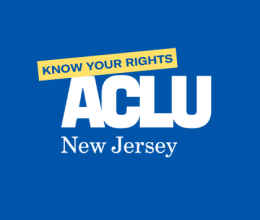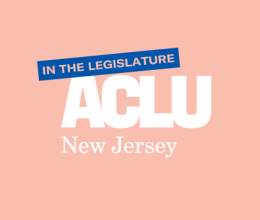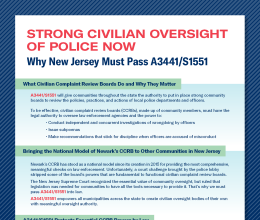
In an opinion issued today, the New Jersey Supreme Court slowed Newark’s march toward community-led police accountability by holding that existing laws limit the powers of the City’s historic Civilian Complaint Review Board (CCRB), reversing in part an earlier appellate court ruling.
Appearing as a friend-of-the-court in the case Fraternal Order of Police, Newark Lodge No. 12 v. the City of Newark, and represented by Lawrence Lustberg, director of the John J. Gibbons Fellowship in Public Interest and Constitutional Law at the law firm Gibbons P.C., the American Civil Liberties Union of New Jersey (ACLU-NJ) and Newark Communities for Accountable Policing (N-CAP) continued the decades-long fight for a CCRB to increase accountability of the Newark Police Department (NPD).
For more than 50 years, Newark communities have called for police accountability through a civilian oversight board. In 2014, community groups formed N-CAP to push for meaningful civilian oversight of the NPD after a United States Department of Justice (DOJ) report revealed rampant unconstitutional policing practices, excessive brutality, and an absence of accountability throughout the operations of the NPD. Less than a year later, in 2015, the CCRB was enacted as one of the most robust civilian oversight bodies in the country.
Newark’s police unions immediately challenged the CCRB’s authority, delaying, and now hampering, the City’s ability to implement its oversight board as intended. In today’s decision, the New Jersey Supreme Court acknowledged the benefits of community oversight, but found that state laws prevented Newark’s CCRB from operating as the City intended. The Court identified the legislative fixes necessary and held that until the Legislature amends relevant statutes, the Newark CCRB will not be able to issue subpoenas and its investigatory powers will be limited.
While the CCRB can continue with some of its oversight role, today’s decision hampers the ability of Newark and other communities to provide for meaningful police accountability. During a time of national protest and conversation about the role of police in communities, the ACLU-NJ, N-CAP, and communities across the state will continue the fight for community-led police accountability in the Legislature.
ACLU-NJ issued the following statements:
Jeanne LoCicero, ACLU-NJ Legal Director: “In the wake of George Floyd’s murder, people around the country and here in New Jersey have been marching and calling for an end to systemic racism in policing and for police accountability. As designed, Newark’s Civilian Complaint Review Board provides a powerful example for police accountability and oversight over misconduct. Today’s decision prevents Newark from fully implementing the CCRB, but residents and community groups have known that this would be a long-term proposition. While the CCRB begins the work it can do, the ACLU-NJ, N-CAP, and other advocates now turn to the Legislature to ensure that communities will be fully empowered to hold police officers accountable.”
Lawrence Lustberg, cooperating attorney: “The Supreme Court’s decision reaffirms the importance of Civilian Complaint Review Boards and makes clear that they have an important role to play in assuring police accountability and building trust between police and the communities that they serve – which is more important than ever. While allowing CCRBs to have input into police operations and even to investigate certain instances of misconduct, the opinion unfortunately stops short of allowing the kind of truly meaningful oversight that Newark courageously sought to effect, by refusing to allow CCRBs to act when Internal Affairs is doing so and by not allowing for the subpoena power that is necessary for a CCRB to function in an effective manner. That said, the opinion provides a road map for the Legislature to correct these problems. I look forward to working with Newark and the community to make sure that the Legislature acts to remedy the statutory insufficiencies identified by the Court so that CCRBs can, in fact, achieve the purposes for which Newark, and so many other cities, created them.”




